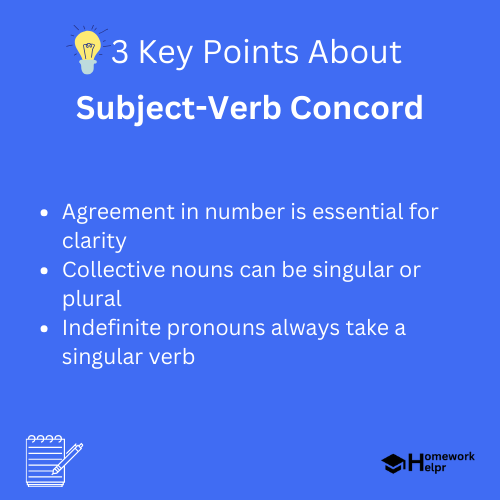📝 Summary
Subject-Verb Concord is a critical principle in English that ensures subjects and verbs agree in number and person. A singular subject takes a singular verb, while a plural subject requires a plural verb, influencing clarity and grammatical correctness. Collective nouns can take singular or plural verbs depending on context, while compound subjects generally use a plural verb. Special cases exist, such as indefinite pronouns always taking a singular verb. Mastering these rules enhances effective communication in writing and speaking.
Understanding Subject-Verb Concord
Subject-Verb Concord, often referred to as subject-verb agreement, is a fundamental principle in the English language that governs how subjects and verbs interact within a sentence. This concept is essential for creating clarity and ensuring that sentences are grammatically correct. Essentially, it means that the verb must agree with its subject in number and person.
Agreement in number means that a singular subject takes a singular verb while a plural subject takes a plural verb. For example, in the sentence “The cat runs,” “cat” is singular, so we use “runs.” Conversely, in “The cats run,” “cats” is plural, which requires the verb “run.” Understanding these rules is crucial for effective communication.
Definition
Concord: A grammatical agreement between parts of a sentence, often related to the subject and verb.
Types of Subjects and Their Verbs
Let‚’ delve deeper into the various forms of subjects and how they correspond to the verb forms. The subject can be a noun, pronoun, or even a phrase, and it can be classified into two main types: singular and plural.
- Singular Subjects: When the subject is a single entity, it appears as he, she, it, or a single noun (e.g., dog, house). In such cases, the verb generally takes the singular form.
- Plural Subjects: When the subject consists of more than one entity, it can appear as they, we, or multiple nouns (e.g., dogs, houses). Here, the verb form typically follows the plural structure.
Examples
1. The boy jumps in the park. (singular subject with singular verb) 2. The boys jump in the park. (plural subject with plural verb)
Agreement with Collective Nouns
Collective nouns are unique as they refer to a group but can be singular or plural based on context. Examples include words like team, family, and crew. If the collective noun acts as a single unit, it takes a singular verb. However, if the focus is on the individual members, a plural verb is employed.
- Example 1: The team is winning. (The team is viewed as a single unit)
- Example 2: The team are arguing among themselves. (Focus on individuals)
❓Did You Know?
Did you know that the word “data” can be singular or plural? In scientific contexts, it’s often treated as plural (“The data are convincing”), while in everyday conversation, it can be singular (“The data is clear.”).
Dealing with Compound Subjects
When sentences contain compound subjects, where two or more subjects are linked by a conjunction (like “and”), the verb typically takes a plural form. For example, in the sentence “Jack and Jill go up the hill,” the compound subject “Jack and Jill” requires the plural verb “go.”
On the other hand, when the subjects are connected by “or” or “nor,” the verb should agree with the subject closest to it. For example, “Either the teacher or the students are here” uses the plural verb because it refers to “students.” Similarly, “Neither the students nor the teacher is present” uses the singular verb as it refers to “teacher.”
Examples
1. Sam and Amy play soccer every Friday. (compound subject with plural verb) 2. Either Mom or the kids have cooked dinner. (verb agrees with ‘kids’, closest subject)
When Subjects and Verbs Don’t Match
In certain cases, especially with indefinite pronouns such as everyone, somebody, and each, the verb form is always singular. For example, “Everyone is invited to the party,” here, the singular verb “is” is used despite the plurality implied in “everyone.”
- Examples with Indefinite Pronouns:
- Everyone has their own opinion.
- Each of the cars is parked outside.
Definition
Indefinite Pronoun: Pronouns that do not refer to any specific person, thing, or amount, e.g., someone, anyone, each.
Special Cases to Consider
Some nouns may look plural but are regarded as singular in terms of agreement. A prime example is words like mathematics, news, and economics. You would say, “Mathematics is fascinating,” where the singular verb “is” is appropriate.
Additionally, certain plurals may be treated as singular when referring to the game or title, such as “The United States is a superpower.” Even though “states” is plural, it is perceived as a single entity.
Examples
1. The news is shocking today. (singular verb for plural noun) 2. The United Nations was founded in 1945. (singular verb for collective entity)
Conclusion
Subject-verb concord is a vital component of grammar that makes communication clear and effective. Understanding how subjects and verbs relate helps produce sentences that are grammatically sound. Remember to consider the type of subject you are working with‚Äîwhether it’s singular or plural, collective or compound, and also pay attention to special exceptions.
By mastering these concepts, you can significantly enhance your writing and speaking skills, ensuring that your sentences are not only correct but also impactful. So next time you write or speak, remember the golden rules of subject-verb agreement!

Related Questions on Subject-Verb Concord
What is subject-verb concord?
Answer: It is the agreement between subjects and verbs.
Why is subject-verb agreement important?
Answer: It ensures grammatical correctness and clarity.
What do collective nouns represent?
Answer: They refer to a group but can be singular or plural based on context.
Can indefinite pronouns take plural verbs?
Answer: No, they always take singular verbs.
